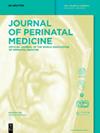Value of fetal echocardiographic examination in pregnancies complicated by preterm premature rupture of membranes
IF 1.4
4区 医学
Q3 OBSTETRICS & GYNECOLOGY
引用次数: 0
Abstract
Objectives Cardiopulmonary and infectious complications are more common in preterm newborns after preterm premature rupture of membranes (pPROM). Fetal echocardiography may be helpful in predicting neonatal condition. Our aim was to assess the cardiovascular changes in fetuses from pregnancies complicated by pPROM and possible utility in predicting the intrauterine or neonatal infection, and neonatal heart failure (HF). Methods It was a prospective study enrolling 46 women with singleton pregnancies complicated by pPROM between 18+0 and 33+6 weeks of gestation and followed until delivery. 46 women with uncomplicated pregnancies served as a control group. Fetal echocardiographic examinations with the assessment of cardiac structure and function (including pulmonary circulation) were performed in all patients. Results Mean gestational age of pPROM patients was 26 weeks. Parameters suggesting impaired cardiac function in fetuses from pPROM were: higher right ventricle Tei index (0.48 vs. 0.42 p<0.001), lower blood flow velocity in Ao z-score (0.14 vs. 0.84 p=0.005), lower cardiovascular profile score (CVPS), higher rate of tricuspid regurgitation (18.2 % vs. 4.4 % p=0.04) and pericardial effusion (32.6 vs. 0 %). Intrauterine infection was diagnosed in 18 patients (39 %). 4 (8.7 %) newborns met the criteria of early onset sepsis (EOS). HF was diagnosed in 9 newborns. In fetal echocardiographic examination HF group had shorter mitral valve inflow time and higher left ventricle Tei index (0.58 vs. 0.49 p=0.007). Conclusions Worse cardiac function was observed in fetuses from pPROM compared to fetuses from uncomplicated pregnancies.胎膜早破并发妊娠中胎儿超声心动图检查的价值
早产胎膜早破(pPROM)后的早产新生儿更容易出现心肺和感染并发症。胎儿超声心动图可能有助于预测新生儿的状况。我们的目的是评估胎膜早破并发症妊娠胎儿的心血管变化,以及在预测宫内感染或新生儿感染和新生儿心力衰竭(HF)方面可能发挥的作用。方法 这是一项前瞻性研究,共招募了 46 名在妊娠 18+0 周至 33+6 周期间并发 pPROM 的单胎妊娠妇女,并对其进行随访直至分娩。46 名无并发症的孕妇作为对照组。对所有患者进行胎儿超声心动图检查,评估心脏结构和功能(包括肺循环)。结果 宫外孕患者的平均胎龄为 26 周。提示pPROM胎儿心脏功能受损的参数有:右心室Tei指数较高(0.48 vs. 0.42 p<0.001)、Ao z-score血流速度较低(0.14 vs. 0.84 p=0.005)、心血管特征评分(CVPS)较低、三尖瓣反流率较高(18.2 % vs. 4.4 % p=0.04)和心包积液(32.6 % vs. 0 %)。18名患者(39%)被诊断出宫内感染。4名新生儿(8.7%)符合早发败血症(EOS)标准。9名新生儿被诊断出患有心房颤动。在胎儿超声心动图检查中,心房颤动组的二尖瓣流入时间更短,左心室Tei指数更高(0.58 vs. 0.49 p=0.007)。结论 与无并发症妊娠的胎儿相比,PPROM 胎儿的心功能较差。
本文章由计算机程序翻译,如有差异,请以英文原文为准。
求助全文
约1分钟内获得全文
求助全文
来源期刊

Journal of Perinatal Medicine
医学-妇产科学
CiteScore
4.40
自引率
8.30%
发文量
183
审稿时长
4-8 weeks
期刊介绍:
The Journal of Perinatal Medicine (JPM) is a truly international forum covering the entire field of perinatal medicine. It is an essential news source for all those obstetricians, neonatologists, perinatologists and allied health professionals who wish to keep abreast of progress in perinatal and related research. Ahead-of-print publishing ensures fastest possible knowledge transfer. The Journal provides statements on themes of topical interest as well as information and different views on controversial topics. It also informs about the academic, organisational and political aims and objectives of the World Association of Perinatal Medicine.
 求助内容:
求助内容: 应助结果提醒方式:
应助结果提醒方式:


